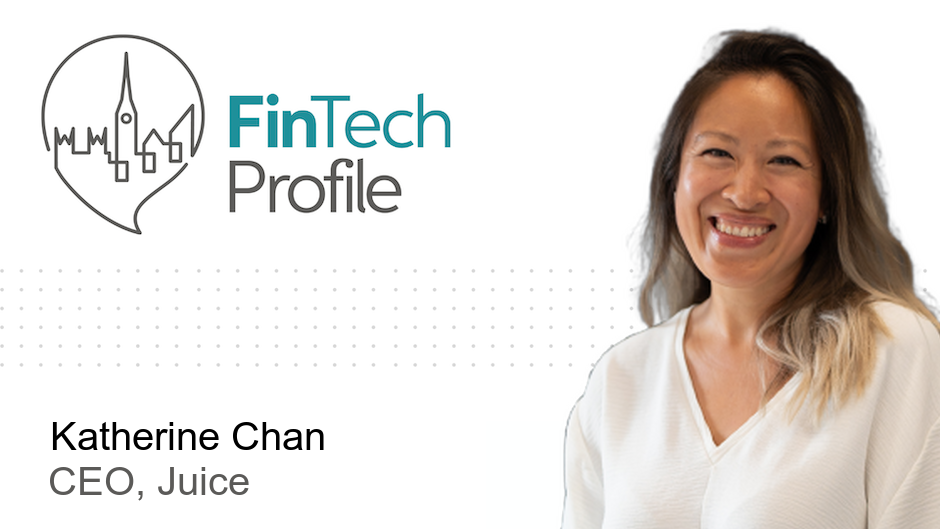Katherine Chan, Chief Executive Officer of Juice

Today we're meeting Katherine Chan, Chief Executive Officer at Juice. They specialise in providing e-commerce businesses the nutrients to grow healthily with its Lines of Credit and Strategic Guidance to empower every founder to create informed decision-making processes.
Over to you Katherine - my questions are in bold:
Who are you and what's your background?
I'm Katherine Chan, the CEO of Juice, a fintech platform built for digital founders backing ambitious SME brands with flexible, non-dilutive capital - replacing friction with freedom. At Juice we're aiming to nourish e-commerce businesses to thrive by taking the growth process together one step at a time through our Lines of Credit and Strategic Guidance.
My business acumen came from my early experience at university, studying Accounting and Business/Management at the University of Melbourne. This set up my finance roots and made my journey into the FinTech arena deeply rewarding.
I've spent over twenty years across roles in banking and risk management at firms including Commerzbank AG, HSBC, and Deutsche Bank as well as experience at Lloyds Banking Group and Nomura. Moving from banking to startups and FinTech, I joined Juice in 2019 originally as Chief Financial Officer and undertook a role in the company's recent growth. Bringing a wealth of experience in finance and risk management I've played a part in driving Juice's evolution.
What is your job title and what are your general responsibilities?
As CEO of Juice, I am responsible for a great deal. I joined as Chief Financial Officer where I was involved in developing financial plans and forecasts, budgeting as a startup and managing regulatory compliance and fund raising, but as CEO my role has shifted.
Being the CEO, I have to embody and fulfil Juice's overall strategy and vision of the future. We're building something great with Juice, so it's important to cultivate a strong leadership and company culture that trickles down into each of our departments. I've recently spent a lot of time with our partners Falco, Aern Capital and Paragon Bank who have been instrumental in our funding journey.
Can you give us an overview of your business?
Juice is an emerging presence in the alternative finance provider industry, aiming to democratise finance by providing SME founders the capital and confidence to achieve their ambitions.
Based on competitive and customer insights, we take a more human approach, less product-led, more founder-focused, offering not just capital, but clarity, support, and strategic insight.
We do this by emphasising the unique flexibility we can share with founders, focusing particularly on female founders and CEOs - who are still few and far between within the B2B finance and digital business space.
Our team consists of digital and financial specialists and experts who provide only the best strategic advice and support to founders in the pursuit of success. Juice always delivers on what it commits to, ensuring its financial resources and strategic plans are reliable tools for its client's growth journey. This is all while being flexible, adaptable to market demands, and openly transparent with its partners.
Tell us how you are funded?
We are funded through family offices and credit lines. Earlier in 2025, we received £25 million in funding from Aern Capital and Falco Capital, underpinned by a credit line from Paragon Bank. Falco Capital have been massive supporters of Juice for years now, contributing funding in our early days. As our solution has grown and proven itself in the market, we've attracted further investors, like Aern Capital, and partners, like Paragon Bank, who believe in our product and want to support us in its journey.
What's the origin story? Why did you start the company? To solve what problems?
Founded in 2019, Juice is a funding solution with trust at its core, providing e-commerce businesses with the nutrients to grow healthily. We inform and encourage ambitious founders to make healthy decisions in the long term, providing a fresh alternative to equity capital. Our smart, considered funding solutions give businesses the boost they need to achieve their potential. Using Lines of Credit and Strategic Guidance, we aim to empower every founder to create informed decision-making processes. We foster sustainable business growth and long-term resilience with an ambitious but achievable plan to build the UK's biggest hub of successful e-commerce founders & business partners.
Juice positions itself on a core collection of brand values. We believe that collaboration is central to our business, specifically with founders and business owners, to shape the future of digital businesses. Information and knowledge are key to our growth, both for the business and the individuals involved, so to support this, we power data-backed insights for all our clients to assist them in making more informed decisions.
Who are your target customers? What's your revenue model?
Juice is designed to help SME's grow. Supporting business growth with smaller, regular payments over time - similar to an amortised repayment schedule to pay as you grow. Our target customer base are businesses that fit into this category, those that seek to only pay for the funding they need as their revenue grows. Our key customers include cosmetics company, Luna Daily, home furnisher, Grain & Frame and drinks manufacturer, Revive Collagen and more.
Our revenue model works by charging a one-off facility fee on the customer's first drawdown and applying a transparent monthly rate only on the funds they actually use. This eliminates sneaky extras, and makes the model a predictable "pay-as-you-grow" income stream. That straightforward structure, plus optional insights-tool access, keeps founders in control and ensures we earn as they scale.
If you had a magic wand, what one thing would you change in the banking and/or FinTech sector?
The funding model for SME's is a fundamentally broken system. SME's by their nature are not in a position to take significant loans out, as their path to success is often uncertain and paying these back is not always guaranteed. I want to see more finance built for businesses that say goodbye to rigid funding methods and open the door to more flexible funding solutions.
What is your message for the larger players in the Financial Services marketplace?
The large financial institutions in the UK hold a lot of power and have a lot of influence in the market. Traditionally, they've been able to pick and choose which start-ups and SMEs receive funding based on their own criteria and that was accepted. Unfortunately, in the current SMEs need more support than just simple funding (if they can even get that).
High-street lenders, while central to the UK's financial infrastructure, are not always well-equipped to meet the evolving needs of SMEs. Many growing businesses today require fast, flexible, and digital-first financing. Traditional banks often struggle to meet these demands due to their legacy systems, longer underwriting processes, and criteria more suited to asset-heavy firms than to modern digital or inventory-led businesses.
It was this problem that led to the creation of Juice. We aim to solve the issues of accessing funding for small businesses and we challenge the way banks are gatekeeping funding to only a few. It's vital we do this as it's those smaller businesses that help keep the UK economy healthy and thriving. If SMEs can't get the support they need to survive, then the ripple effect of their loss will be felt nationwide.
Where do you get your Financial Services/FinTech industry news from?
I'll go to the classics, like The Financial Times and EU Startups, but I'm finding a lot of value reading recent happenings in the e-commerce press. My eyes are turning towards titles like Ecommerce Times and Ecommerce News UK.
Can you list 3 people you rate from the FinTech and/or Financial Services sector that we should be following on LinkedIn, and why?
- Marcel van Oost - I think his Connecting the dots in FinTech newsletter is fantastic - it easily makes complicated details and stories into interesting bitesized chunks for all knowledge levels to digest.
- Theodora (Theo) Lau - she is the founder of Unconventional Ventures, a banking and financial services consulting firm with a long history in the fintech sector. She does public speaking, writes about banking and AI and made it onto American Banker's Top 20 Most Influential Women in Fintech list. Needless to say, her reputation in this sector is spectacular and she is always providing great insight on her LinkedIn page that fintech founders should be paying attention to.
For the third option, I want to recommend a group of people doing important work to improve the financial services industry. They are the Invest in Women Task Force, co-founded by Debbie Wosskow OBE and Hannah Bernard OBE. This organisation is helping female founders take their first steps into the fintech industry by investing in their ideas. The gender balance in the sector is ripe for improvement and this initiative exists to address that.
What FinTech services (and/or apps) do you personally use?
The primary fintech I use on a day-to-day basis is Revolut, for many of my banking needs. I do still have a traditional bank, as I think it's important to have options, and Revolut helps to cover the gaps that legacy banks struggle to cover. In particular, this support comes from how agile Revolut is, a vital need when working with small businesses.
What's the best new FinTech product or service you've seen recently?
There are three FinTech products that have really stood out to me recently. The first is embedded lending, a solution that enables digital platforms to offer loans and other lending services without sending the customer to a new webpage or application. Similar to the principles behind embedded finance, this provides a more streamlined and convenient experience for the cardholder.
Next up is AI driven personalisation, a system that uses available customer data - such as demographic, browsing and purchasing history, social media interactions, past behaviours - to create a profile of them that can be used to customise the experience for them. In the fintech and payments space, this supports businesses in suggesting payment methods and financial services to their customers, making it easier to create a bespoke experience for the end user. This has been shown to improve customer loyalty and in a competitive modern market this is vital.
Lastly, and perhaps the most common of these, is real-time payments. We are long past the point where payments can take days, or even weeks, to transfer between two accounts and as time goes on the technology has been improving, becoming near instantaneous. It is very convenient.
Finally, let's talk about predictions. What trends do you think are going to define the next few years in the FinTech sector?
As we move toward the future of SME lending, several key factors are set to play a significant role in shaping the industry. I already spoke about embedded lending before, but in general embedded finance is going to be a powerhouse in fintech over the next few years. The ability to embed a financial service into a checkout or payments application is appealing to the end user for its convenience and its only becoming more common.
AI is already a major trend, taking many different forms and across many sectors. For the fintech scene, agentic AI is the version of it that I think will bring in the most change. Agentic AI is the name given to AI decision making solutions, where an AI makes an informed solution, based on inputted data, without any human intervention. We're already seeing it make a difference in the lending space, greatly speeding up the lending process and helping founders to make more informed decisions on their alternative finance goals.
Since COVID-19 kept us all locked inside at the start of this decade, many customers have moved away from physical cash to digital currency; but that digital currency is still based on physical currency locked away in a bank. The financial networks behind this is complicated and costs a lot to maintain, but if we move to digital currency then governments and banks can bring some of that cost down.
This is what Central Bank Digital Currency (CBDC) has been introduced to do. A digital currency, similar in principle to decentralised finance, but a fiat-currency that is just as valuable as local currencies. It's easy for the cardholder to understand its value while being cheaper to maintain and trade cross-border. It's a natural step on the road to an all-digital future that fintech has been heading down and I think it will continue to become more common as the year goes on.
Lastly, compliance automation will become more common as well. ISO 20022 is being introduced later this year and many fintechs are working to ensure they are complying with its regulations. The compliance process is often a long and costly one so anyway to make that easier is welcome, and in the same way AI decision making can reduce time on customer driven decisions, compliance automation can take some of the hassle out of the compliance process. With new compliance and regulation protocols frequently introduced, I expect to see further improvements in the compliance process for fintechs.
Thank you very much, Katherine!
Read more about Katherine Chan on LinkedIn and find out more about Juice at getmejuice.com.




